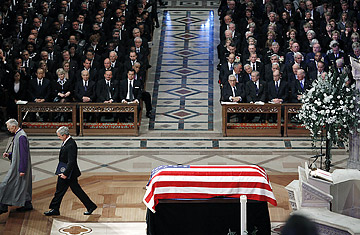
U.S. President George W. Bush walks past the casket of former U.S. President Gerald Ford during a funeral service January 2, 2007 in Washigton DC.
The nation's political establishment, 3,244 strong, filed solemnly into the Washington National Cathedral for a service, as the program put it, "in celebration of and thanksgiving for" Gerald Rudolph Ford, President of the United States in the tumultuous post-Watergate years. Bob Michel, Al D'Amato, Paul Laxalt — the mourners, who now get together only for conventions and funerals, vividly evoked a very different time in American politics, and a very different Republican Party.
It was an imperial farewell for a simple man. The hymns, prayers and Bible readings by two of his four children, John (Jack) Ford and Susan Ford Bales, echoed through the stained-glass splendor of a cathedral that is the sixth largest in the world and second largest in the U.S. Christmas trees and pin wreaths still graced the columns and alcoves. The two-football-fields-long cathedral has been the site of funerals and memorial services for a dozen Presidents.
"Hail to the Chief" sounded outside, one last time for the 38th President. Then service members, four on each side, walked the casket to the front of the cathedral, placing it gently on a stand covered in black satin. The choir sang a soothing version of "America the Beautiful."
Two years and seven months ago, Ford and his wife, Betty, sat in the same cathedral for the funeral of the next Republican to succeed him in the White House, Ronald Reagan. Now, the tributes were pouring out for Ford, who became President after Richard Nixon's resignation and served from 1974 to 1977.
Former President George H.W. Bush, who had challenged Ford in the Republican primaries of 1976, noted that Americans tend to "eschew notions of the indispensible man," but said Ford was a perfect match of man and moment. "Gerald Ford's decency was the ideal remedy for the deception of Watergate," the former President said. Several times he said: "Gerry Ford's word was always good."
The former President Bush provided the service's lightest moment when he spoke of the irony of Chevy Chase lampooning one of the more athletic Presidents as a bumbler. He added that he could go on about the need for those in the public eye to be able to laugh at themselves. "But as Dana Carvey would say," he said, segueing into a dead-on impression of his former Saturday Night Live tormenter: "Not gonna do it. Wouldn't be prudent."
Henry Kissinger spoke of his former boss as "unassuming and without guile" and "not consumed by driving ambition," and said he came to the public stage "as a leader, not as a performer playing to the gallery."
Speakers wrestled with the freshet of platitudes, insisting that this time they were true. Former NBC anchorman Tom Brokaw, who covered Ford as a member of the White House press corps, admitted, "We went to Vail at Christmas and Palm Springs at Easter — with our families." He concluded, "Farewell, Mr. President. Thank you, citizen Ford."
President Bush saluted Ford for bringing his calm to "one of the most divisive moments in our nation's history," and said he was revered "because America needed him, not because he needed the office." It was a unique element of an uncommon Presidency.
